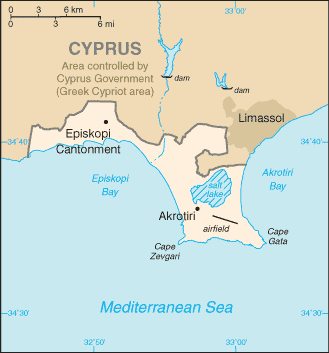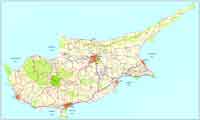|
|
Akrotiri and Dhekelia are two areas on the island of Cyprus that comprise the Sovereign Base Areas Overseas Territory of the United Kingdom. The bases were retained by the UK following the transition of Cyprus' status from a colony in the British Empire to an independent republic within the Commonwealth of Nations. The United Kingdom retained the bases arising from the strategic location of Cyprus in the Mediterranean Sea. The Bases are split into Akrotiri (Greek: Ακρωτήρι; Turkish: Agrotur, along with Episkopi Garrison, is part of an area known as the Western Sovereign Base Area or WSBA) and Dhekelia (Greek: Δεκέλεια; Turkish: Dikelya, along with Ayios Nikolaos, is part of the Eastern Sovereign Base Area or ESBA.) History The Sovereign Base Areas were created in 1960 by the Treaty of Establishment, when Cyprus, a colony within the British Empire, was granted independence. The United Kingdom wished to retain sovereignty over these areas, as this guaranteed the use of UK military bases in Cyprus, including RAF Akrotiri, and a garrison of the British Army. The importance of the Bases to the British is based on the strategic location of Cyprus, at the eastern edge of the Mediterranean, close to the Suez Canal and the Middle East; the ability to use the RAF base as staging post for military aircraft; and for general training purposes. In 1974, Turkey invaded the North of Cyprus, leading to the establishment of the Turkish Republic of Northern Cyprus. However, this did not affect the status of the Bases, and the British were not involved in the fighting. Greek-Cypriots fleeing from the Turks were permitted to travel through the Dhekelia base, and were given humanitarian aid. The Turkish advance halted when it reached the edge of the base area, rather than risk war with Britain. The Ayia Napa area was thus preserved in Greek hands. Cyprus has occasionally demanded the return of Akrotiri and Dhekelia, citing that the bases take up a large amount of territory that could be used for civilian development. For 4 years after Cypriot independence in 1960, the British government paid the Republic of Cyprus rent for the bases. After the intercommunal conflict of 1963-64 they stopped, claiming there was no guarantee that both communities would benefit equally from that money. The Cypriot government is still claiming money for the years from 1964 to now. Estimates for this range from several hundred thousand to over one billion Euros. In July 2001, violent protests were held at the Bases by local Cypriots, angry at British plans to construct radio masts at the bases, as part of an upgrade of British military communication posts around the world. Locals had claimed the masts would endanger local lives and cause cancer, as well as have a negative impact on wildlife in the area. The British government denied these claims. The UK has shown no intention of surrendering the Bases, although it has offered to surrender 45 square miles of farmland as part of the rejected Annan Plan for Cyprus. Today, around 3,000 troops of British Forces Cyprus are based at Akrotiri and Dhekelia. Ayios Nikolaos, in the ESBA, is a listening station of the intelligence network ECHELON.
Map of Akrotiri (Western) SBA, Map of Dhekelia (Eastern) SBA Politics The Bases are administered by the Administrator of the Sovereign Base Areas, who is the Commander British Forces Cyprus. The Administrator is officially appointed by the British monarch, on the advice of the Ministry of Defence. The Administrator has all the executive and legislative authority of a Governor of an overseas territory. A Chief Officer is appointed, and is responsible to the Administrator for the day-to-day running of the civil government. No elections are held in the Bases, although British citizens are normally entitled to vote in United Kingdom elections (as British Forces or overseas electors). Law The Bases have their own legal system, distinct from the UK and Cyprus. This consists of the laws of the Colony of Cyprus as at August 1960, amended as necessary. The laws of Akrotiri and Dhekelia are kept, as far as possible, the same as the laws of Cyprus. The Court of the Sovereign Base Area is concerned with non-military offences committed by any person within Akrotiri and Dhekelia. Geography Akrotiri and Dhekelia cover 3% of the land area of Cyprus, a total of 98 square miles (47.5 at Akrotiri and 50.5 at Dhekelia). 60% of the land is privately owned, either by British or Cypriot citizens. The other 40% is owned by the Ministry of Defence, or is classed as Crown land. In addition to Akrotiri and Dhekelia themselves, the Treaty of Establishment also provides for the continued use by the British Government of certain facilities within Cyprus, known as Retained Sites. Akrotiri is located in the south of the island, near the city of Limassol (or Lemesos). Dhekelia is in the southeast, near Larnaca. Both of these areas include military bases, as well as farmland and some residential land. Akrotiri is surrounded by territory controlled by the Republic of Cyprus, but Dhekelia also borders on the United Nations (UN) buffer zone and the Turkish-occupied part of the island. Ayia Napa lies to the East of Dhekelia. The villages of Xylotymvou and Ormidhia, also in the Republic of Cyprus, are enclaves surrounded by Dhekelia SBA. The Dhekelia Power Station, divided by a British road into two parts, also belongs to Cyprus. The northern part is an enclave, like the two villages, whereas the southern part is located by the sea, and therefore not an enclave, though it has no territorial waters of its own. Demographics When the Bases were being established, the boundaries were drawn up to avoid centres of population. However, around 14,000 people live in the Bases. Around 7,000 native Cypriots live in the Bases, who either work in the Bases themselves, or on farmland within the boundaries of the Bases. The British military and their families make up the rest of the population. There is no specific citizenship available for the Bases, although some people may be able to claim British Overseas Territories citizenship (BOTC) status. Unlike all other British territories, BOTCs connected solely with the Sovereign Base Areas do not have any entitlement to full British citizenship. Under the terms of the 1960 agreement with Cyprus establishing the Sovereign Base Areas, the United Kingdom is committed not to use the Areas for civilian purposes. This was stated in 2002 as the primary reason for the exclusion of the Areas from the scope of the British Overseas Territories Act 2002 Economy There are no economic statistics gathered for Akrotiri and Dhekelia. The main economic activities are the provision of services to the military, and limited agriculture. References Vassilis K. Fouskas. 2003. Zones of Conflict: U.S. Foreign Policy in the Balkans and the Greater Middle East. Pluto Press. ISBN 0745320309. Pp. 93, 111 Links
Retrieved from "http://en.wikipedia.org/"
 |
|
||||||||||||||


